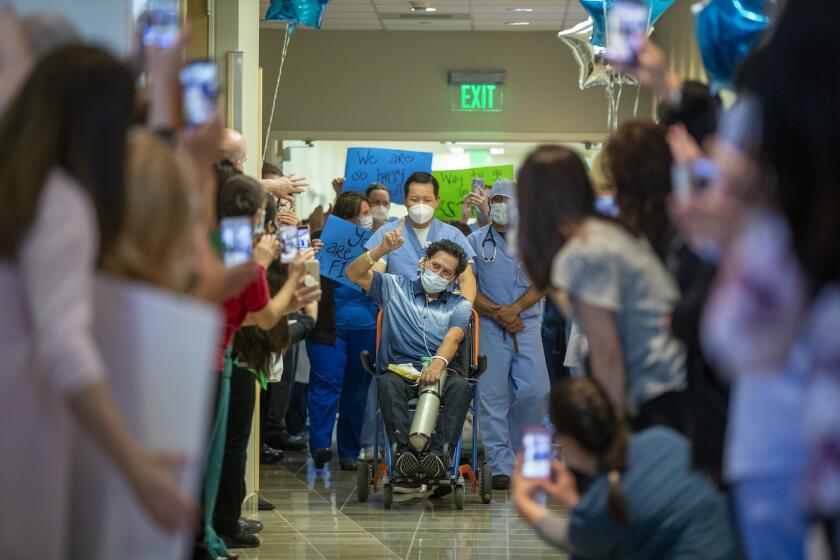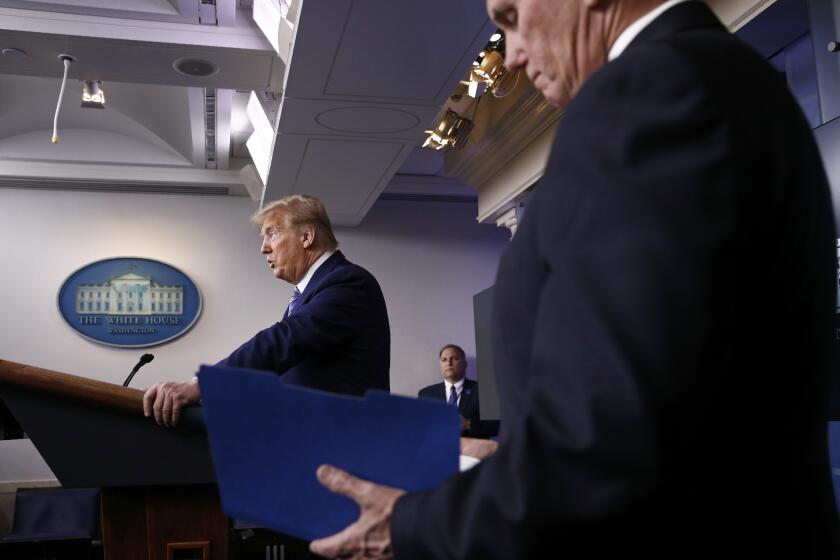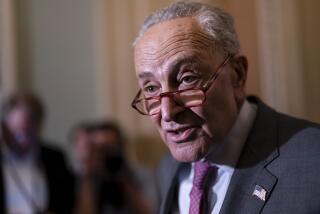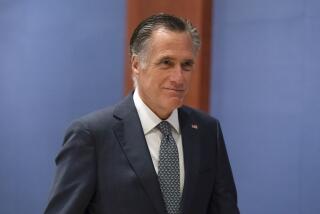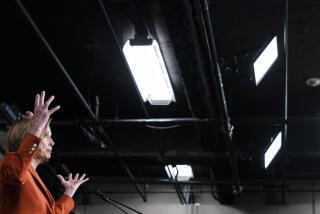Trump administration and Democrats near deal for more coronavirus aid to small businesses
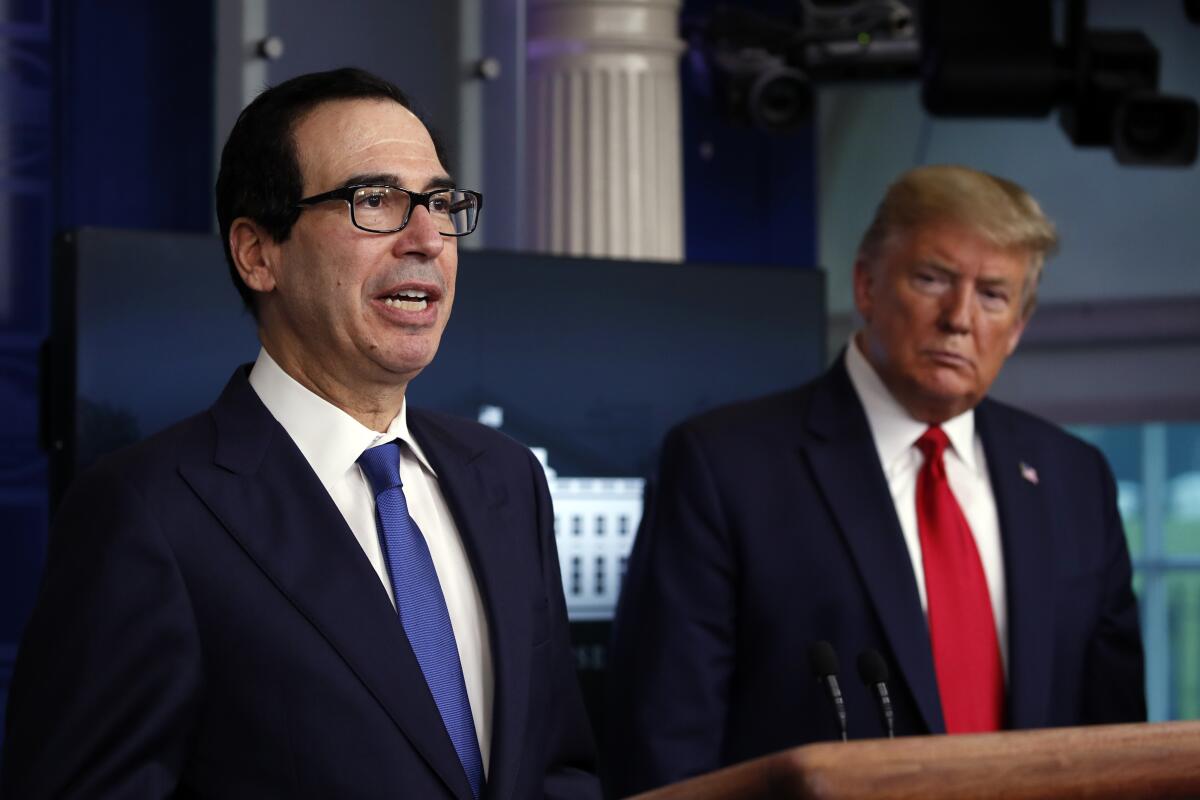
- Share via
WASHINGTON — The Trump administration and congressional Democrats expressed optimism Sunday that more than $450 billion in loans and aid to Americans most affected by the coronavirus outbreak will be enacted this week, providing a measure of financial help as the U.S. death toll passes 40,000.
The bulk of the money is aimed at helping small-business owners, many of them pushed to collapse by the weeks-long shutdown of bars, restaurants, shops and other businesses in much of the country.
The package would also earmark $25 billion for coronavirus testing, which has become a major point of contention between President Trump and the nation’s governors, and $75 billion for beleaguered hospitals, Treasury Secretary Steven T. Mnuchin said Sunday.
After negotiations over the weekend with Mnuchin, House Speaker Nancy Pelosi (D-San Francisco) and Senate Minority Leader Charles E. Schumer (D-N.Y.) both agreed that a deal was close. The Senate could vote as soon as Monday, and House members were told the chamber could meet Wednesday for a recorded vote.
The two sides were still struggling to reconcile differences over whether to add aid to states and municipalities, which Democrats said would provide a lifeline for first responders and workers such as bus drivers who are in close contact with the public.
The deal would swiftly replenish a loan program run by the Small Business Administration that is already essentially tapped out three weeks after it passed as part of a broader $2-trillion rescue package.
Mnuchin said the Paycheck Protection Program would receive about $300 billion. The deal also would add $60 billion to a separate emergency loan program for small businesses that also is out of money, Schumer said. Some of the loans would be specifically targeted to rural and minority-owned businesses.
“I think we’re making a lot of progress,” Mnuchin, who has handled the White House negotiations with congressional leaders, told CNN’s “State of the Union.” Mnuchin said he had “multiple conversations all weekend” with House and Senate leaders of both parties.
“I think we’re very close to a deal today,” he said, “and I’m hopeful that we can get that done.”
Schumer said on the same program that the two sides had “a few more issues to deal with,” but he pronounced himself “very, very hopeful” about an imminent agreement.
Pelosi, appearing on ABC’s “This Week,” agreed that they were “very close” to finalizing a deal.
The Senate plans to hold a brief session Monday afternoon, during which the Republican and Democratic leaders could pass the deal if no single senator objects. The House is slated to hold a similar brief session Tuesday.
Pelosi, who has accused Trump of failing as a leader during the pandemic, said on “Fox News Sunday” that he “deserves an F” for his response to the crisis but that bipartisan efforts to help Americans must move quickly ahead.
Since taking effect last month, the Payroll Protection Program has approved almost 1.7 million taxpayer-backed loans to small businesses, mostly to help keep paying employees. The flood of applications has nearly exhausted the $349 billion available, with thousands of small businesses still in urgent need of help.
Hospitals across the country have been hit hard not only by the wave of patients with COVID-19, the disease caused by the coronavirus, but also by emergency steps such as putting off elective surgeries, which for most are a consistent source of cash flow. The $75 billion earmarked for them is meant to ease that shortfall.
These are some of the unusual new scenes across the Southland during the coronavirus outbreak.
Along with the hospital funding, Democrats have pushed hard for the $25 billion for coronavirus testing, which public health authorities say is crucial to determine how severe the outbreak remains, and who should be isolated, before stay-at-home restrictions are lifted.
On Thursday, three days after Trump had asserted “total” authority to reopen states, he did an abrupt about-face and announced that the governors — not the federal government — should assume responsibility for testing and deciding when it was safe for people to return to work and schools.
Schumer said on CNN that there “ought to be one person” ensuring a “national focus and effort on testing,” instead of a 50-state patchwork approach.
Democrats have sought an additional $150 billion for cities and states suffering a huge loss of tax revenues even as they spend heavily to cope with the crisis, but Republicans have opposed using federal funds to fill local and state budget shortfalls.
“The president is willing to consider that in the next bill but wants to get this over the finish line with a focus on small businesses, hospitals and testing,” Mnuchin said.
Pelosi and other Democrats have portrayed the requested state and local aid as meant to support those on the pandemic’s front lines.
“Our lives and well-being are threatened if health care, police, EMS, teachers and other essential workers are let go,” the House speaker wrote in a letter to colleagues Saturday. “These vital workers need our help now.”
President Trump has pushed for the the U.S. to reopen amid the COVID-19 pandemic. But many state leaders say coronavirus testing lags too far behind to do it safely right now.
Even those who support more state and local funding acknowledged that might be a losing battle for now.
The Republican head of the National Governors Assn., Maryland’s Larry Hogan, said on CNN that state and municipal aid is “desperately needed” but that perhaps it would have to wait.
“Look, we do not want to hold up funding to these small businesses,” he said.
The president of the U.S. Chamber of Commerce, Suzanne Clark, called the latest proposal “a good start” but said lawmakers must move quickly.
“We know that the small businesses out there are really hurting,” she said on CBS’ “Face the Nation.” ”And every hour and day that goes by without this assistance is really hurting them.”
Mnuchin was asked on CNN if the delivery of $1,200 checks to individual Americans, part of the previous aid package, was delayed because Trump wanted to put his name on them. In the end, his name appears in the memo line but not as a signature on the checks.
Critics said either move suggested that the funds were somehow Trump’s personal largesse rather than the disbursement of taxpayer-supplied federal funds.
Mnuchin said that it would have been permissible to use the president’s signature rather than that of a Treasury official, but that the idea was dropped because it would have caused a delay. In any event, he said, the notion didn’t originate with Trump.
“That was my idea,” Mnuchin said. “He is the president, and I think it’s a terrific symbol to the American public.”
Times staff writer Jennifer Haberkorn contributed to this report.
Devoted family man Clayton Kershaw sorely misses Dodgers baseball, but he explains why he won’t agree to several months apart from his wife and kids.
More to Read
Get the L.A. Times Politics newsletter
Deeply reported insights into legislation, politics and policy from Sacramento, Washington and beyond. In your inbox three times per week.
You may occasionally receive promotional content from the Los Angeles Times.
